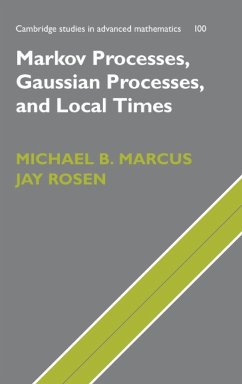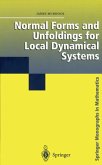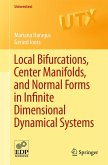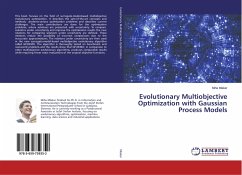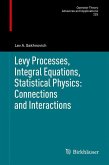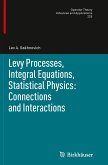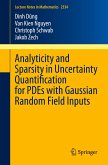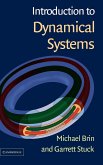A readable synthesis of three main areas in the modern theory of stochastic processes.
Written by two foremost researchers in the field, this book studies the local times of Markov processes by employing isomorphism theorems that relate them to certain associated Gaussian processes. It builds to this material through self-contained but harmonized 'mini-courses' on the relevant ingredients, which assume only knowledge of measure-theoretic probability. The streamlined selection of topics creates an easy entrance for students and for experts in related fields. The book starts by developing the fundamentals of Markov process theory and then of Gaussian process theory, including sample path properties. It then proceeds to more advanced results, bringing the reader to the heart of contemporary research. It presents the remarkable isomorphism theorems of Dynkin and Eisenbaum, then shows how they can be applied to obtain new properties of Markov processes by using well-established techniques in Gaussian process theory. This original, readable book will appeal to both researchers and advanced graduate students.
Review quote:
"The main theme of this book is to introduce the isomorphism theorem of E. B. Dynkin, and derive a number of its powerful consequences. The isomorphism theorem describes a beautiful connection between the seemingly-disparate theories of Gaussian processes and Markov processes. This book presents a definitive account, and is written by two of the leading authorities in this exciting subject. It is well-crafted, and a pleasure to read. Because the authors have painstakingly worked out a large number of examples throughout the text, it should be very accessible to interested graduate students, as well as researchers.
It is clear that this text is the standard reference for those who wish to learn about the powerful isomorphism theorem. But I was surprised to find that within this book lies also completely self-contained, and lively, introductions to Gaussian processes and Markov processes. Each will make for a lovely textbook in the respective area. Both are accessible to graduate students and researchers in probability and analysis."
Davar Khoshnevisan, University of Utah
Table of contents:
1. Introduction; 2. Brownian motion and Ray-Knight theorems; 3. Markov processes and local times; 4. Constructing Markov processes; 5. Basic properties of Gaussian processes; 6. Continuity and boundedness; 7. Moduli of continuity; 8. Isomorphism theorems; 9. Sample path properties of local times; 10. p-Variation; 11. Most visited site; 12. Local times of diffusions; 13. Associated Gaussian processes; Appendices: A. Kolmogorov's theorem for path continuity; B. Bessel processes; C. Analytic sets and the projection theorem; D. Hille-Yosida theorem; E. Stone-Weierstrass theorems; F. Independent random variables; G. Regularly varying functions; H. Some useful inequalities; I. Some linear algebra; References; Index.
Hinweis: Dieser Artikel kann nur an eine deutsche Lieferadresse ausgeliefert werden.
Written by two foremost researchers in the field, this book studies the local times of Markov processes by employing isomorphism theorems that relate them to certain associated Gaussian processes. It builds to this material through self-contained but harmonized 'mini-courses' on the relevant ingredients, which assume only knowledge of measure-theoretic probability. The streamlined selection of topics creates an easy entrance for students and for experts in related fields. The book starts by developing the fundamentals of Markov process theory and then of Gaussian process theory, including sample path properties. It then proceeds to more advanced results, bringing the reader to the heart of contemporary research. It presents the remarkable isomorphism theorems of Dynkin and Eisenbaum, then shows how they can be applied to obtain new properties of Markov processes by using well-established techniques in Gaussian process theory. This original, readable book will appeal to both researchers and advanced graduate students.
Review quote:
"The main theme of this book is to introduce the isomorphism theorem of E. B. Dynkin, and derive a number of its powerful consequences. The isomorphism theorem describes a beautiful connection between the seemingly-disparate theories of Gaussian processes and Markov processes. This book presents a definitive account, and is written by two of the leading authorities in this exciting subject. It is well-crafted, and a pleasure to read. Because the authors have painstakingly worked out a large number of examples throughout the text, it should be very accessible to interested graduate students, as well as researchers.
It is clear that this text is the standard reference for those who wish to learn about the powerful isomorphism theorem. But I was surprised to find that within this book lies also completely self-contained, and lively, introductions to Gaussian processes and Markov processes. Each will make for a lovely textbook in the respective area. Both are accessible to graduate students and researchers in probability and analysis."
Davar Khoshnevisan, University of Utah
Table of contents:
1. Introduction; 2. Brownian motion and Ray-Knight theorems; 3. Markov processes and local times; 4. Constructing Markov processes; 5. Basic properties of Gaussian processes; 6. Continuity and boundedness; 7. Moduli of continuity; 8. Isomorphism theorems; 9. Sample path properties of local times; 10. p-Variation; 11. Most visited site; 12. Local times of diffusions; 13. Associated Gaussian processes; Appendices: A. Kolmogorov's theorem for path continuity; B. Bessel processes; C. Analytic sets and the projection theorem; D. Hille-Yosida theorem; E. Stone-Weierstrass theorems; F. Independent random variables; G. Regularly varying functions; H. Some useful inequalities; I. Some linear algebra; References; Index.
Hinweis: Dieser Artikel kann nur an eine deutsche Lieferadresse ausgeliefert werden.

